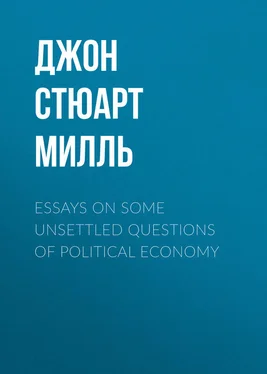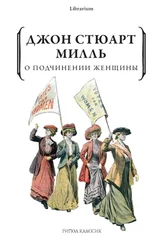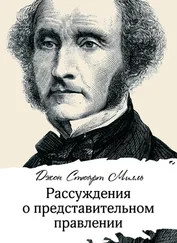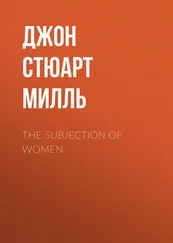Джон Милль - Essays on some unsettled Questions of Political Economy
Здесь есть возможность читать онлайн «Джон Милль - Essays on some unsettled Questions of Political Economy» — ознакомительный отрывок электронной книги совершенно бесплатно, а после прочтения отрывка купить полную версию. В некоторых случаях можно слушать аудио, скачать через торрент в формате fb2 и присутствует краткое содержание. Жанр: Философия, literature_19, foreign_antique, foreign_prose, на английском языке. Описание произведения, (предисловие) а так же отзывы посетителей доступны на портале библиотеки ЛибКат.
- Название:Essays on some unsettled Questions of Political Economy
- Автор:
- Жанр:
- Год:неизвестен
- ISBN:нет данных
- Рейтинг книги:4 / 5. Голосов: 1
-
Избранное:Добавить в избранное
- Отзывы:
-
Ваша оценка:
- 80
- 1
- 2
- 3
- 4
- 5
Essays on some unsettled Questions of Political Economy: краткое содержание, описание и аннотация
Предлагаем к чтению аннотацию, описание, краткое содержание или предисловие (зависит от того, что написал сам автор книги «Essays on some unsettled Questions of Political Economy»). Если вы не нашли необходимую информацию о книге — напишите в комментариях, мы постараемся отыскать её.
Essays on some unsettled Questions of Political Economy — читать онлайн ознакомительный отрывок
Ниже представлен текст книги, разбитый по страницам. Система сохранения места последней прочитанной страницы, позволяет с удобством читать онлайн бесплатно книгу «Essays on some unsettled Questions of Political Economy», без необходимости каждый раз заново искать на чём Вы остановились. Поставьте закладку, и сможете в любой момент перейти на страницу, на которой закончили чтение.
Интервал:
Закладка:
It is not an impossible supposition that, by taxing our exports, we might not only gain nothing from the foreigner, the tax being paid out of our own pockets, but might even compel our own people to pay a second tax to the foreigner. Suppose, as before, that the demand of Germany for cloth falls off so much on the imposition of the duty, that she requires a smaller money value than before, but that the case is so different with linen in England, that when the price rises the demand either does not fall off at all, or so little that the money value required is greater than before. The first effect of laying on the duty is, as before, that the cloth exported will no longer pay for the linen imported. Money will, therefore, flow out of England into Germany. One effect is to raise the price of linen in Germany, and, consequently, in England. But this, by the supposition, instead of stopping the efflux of money, only makes it greater, because the higher the price, the greater the money value of the linen consumed. The balance, therefore, can only be restored by the other effect, which is going on at the same time, namely, the fall of cloth in the English, and, consequently, in the German market. Even when cloth has fallen so low that its price with the duty is only equal to what its price without the duty was at first, it is not a necessary consequence that the fall will stop; for the same amount of exportation as before will not now suffice to pay the increased money value of the imports; and although the German consumers have now not only cloth at the old price, but likewise increased money incomes, it is not certain that they will be inclined to employ the increase of their incomes in increasing their purchases of cloth. The price of cloth, therefore, must perhaps fall, to restore the equilibrium, more than the whole amount of the duty; Germany may be enabled to import cloth at a lower price when it is taxed, than when it was untaxed: and this gain she will acquire at the expense of the English consumers of linen, who, in addition, will be the real payers of the whole of what is received at their own custom-house under the name of duties on the export of cloth.
Such are the extremely various effects which may result to ourselves, and to our customers, from the imposition of taxes on our exports 3 3 We have not deemed it necessary to enter minutely into all the circumstances which might modify the results mentioned in the text. For example, let us revert to the first case, that in which the demand for cloth in Germany is so little affected by the rise of price in consequence of the tax, that the quantity bought exceeds in pecuniary value what it was before. As the German consumers lay out more money in cloth, they have less to lay out in other things; other money prices will fall; among the rest that of linen; and this may so increase the demand for linen in England as to restore the equilibrium of exports and imports without any passage of money. But England's treasury will still gain from Germany the whole of the tax, and the English people will buy their linen cheaper besides. Again, in the opposite case, where the tax so diminishes the demand, that a smaller pecuniary value is required than before. The German consumers have, therefore, more to expend in other things; these, and among the rest linen, will rise; and this may so diminish the demand for linen in England, as to restore the equilibrium without the transmission of money. But the effect, as respects the division of the advantage, is still as stated in the text.
: and the determining circumstances are of a nature so imperfectly ascertainable, that it must be almost impossible to decide with any certainty, even after the tax has been imposed, whether we have been gainers by it or losers. It is certain, however, that whatever we gain, is lost by somebody else, and there is the expense of the collection besides: if international morality, therefore, were rightly understood and acted upon, such taxes, as being contrary to the universal weal, would not exist. Moreover, the imposition of such a tax frequently will, and always may, expose a country to lose this branch of its trade altogether, or to carry it on with diminished advantage, in consequence of the competition of untaxed exporters from other countries, or of the domestic producers in the country to which it exports. Even on the most selfish principles, therefore, the benefit of such a tax is always extremely precarious.
5. We have had an example of a tax on exports, that is, on foreigners, falling in part on ourselves. We shall, therefore, not be surprised if we find a tax on imports, that is, on ourselves, partly falling upon foreigners.
Instead of taxing the cloth which we export, suppose that we tax the linen which we import. The duty which we are now supposing must not be what is termed a protecting duty, that is, a duty sufficiently high to induce us to produce the article at home. If it had this effect, it would destroy entirely the trade both in cloth and in linen, and both countries would lose the whole of the advantage which they previously gained by exchanging those commodities with one another. We suppose a duty which might diminish the consumption of the article, but which would not prevent us from continuing to import, as before, whatever linen we did consume.
The equilibrium of trade would be disturbed if the imposition of the tax diminished in the slightest degree the quantity of linen consumed. For, as the tax is levied at our own custom-house, the German exporter only receives the same price as formerly, though the English consumer pays a higher one. If, therefore, there be any diminution of the quantity bought, although a larger sum of money may be actually laid out in the article, a smaller one will be due from England to Germany: this sum will no longer be an equivalent for the sum due from Germany to England for cloth, the balance therefore must be paid in money. Prices will fall in Germany, and rise in England; linen will fall in the German market; cloth will rise in the English. The Germans will pay higher price for cloth, and will have smaller money incomes to buy it with; while the English will obtain linen cheaper, that is, its price will exceed what it previously was by less than the amount of the duty, while their means of purchasing it will be increased by the increase of their money incomes.
If the imposition of the tax does not diminish the demand, it will leave the trade exactly as it was before. We shall import as much, and export as much; the whole of the tax will be paid out of our own pockets.
But the imposition of a tax on a commodity, almost always diminishes the demand more or less; and it can never, or scarcely ever increase the demand. It may, therefore, be laid down as a principle, that a tax on imported commodities, when it really operates as a tax, and not as a prohibition, either total or partial, almost always falls in part upon the foreigners who consume our goods: and that this is a mode in which a nation may be almost sure of appropriating to itself, at the expense of foreigners, a larger share than would otherwise belong to it of the increase in the general productiveness of the labour and capital of the world, which results from the interchange of commodities among nations.
It is scarcely necessary to observe, that no such advantage can result from the duty, if it operate as a protecting duty; if it induce the country which imposes it, to produce for herself that which she would otherwise have imported. The saving of labour – the increase in the general productiveness of the capital of the world – which is the effect of commerce, and which a non-protecting duty would enable the country imposing it to engross, could not be engrossed by a protecting duty, because such a duty prevents any such increased production from existing.
Читать дальшеИнтервал:
Закладка:
Похожие книги на «Essays on some unsettled Questions of Political Economy»
Представляем Вашему вниманию похожие книги на «Essays on some unsettled Questions of Political Economy» списком для выбора. Мы отобрали схожую по названию и смыслу литературу в надежде предоставить читателям больше вариантов отыскать новые, интересные, ещё непрочитанные произведения.
Обсуждение, отзывы о книге «Essays on some unsettled Questions of Political Economy» и просто собственные мнения читателей. Оставьте ваши комментарии, напишите, что Вы думаете о произведении, его смысле или главных героях. Укажите что конкретно понравилось, а что нет, и почему Вы так считаете.











